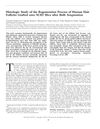 46 citations,
January 2020 in “Theranostics”
46 citations,
January 2020 in “Theranostics” Injecting a special gel with human protein particles can help hair grow.
 34 citations,
May 2012 in “International Journal of Molecular Sciences”
34 citations,
May 2012 in “International Journal of Molecular Sciences” Dieckol from Ecklonia cava may help hair growth and could be a potential hair loss treatment.
 28 citations,
March 2019 in “Journal of Dermatological Science”
28 citations,
March 2019 in “Journal of Dermatological Science” The document concludes that while lab results for hair growth promotion are promising, human trials are needed and better testing methods should be developed.
 19 citations,
November 2001 in “Journal of Investigative Dermatology Symposium Proceedings”
19 citations,
November 2001 in “Journal of Investigative Dermatology Symposium Proceedings” Human hair follicles can regenerate and recover after severe injury by going through a brief abnormal resting phase before growing again.
 8 citations,
July 2017 in “Biochemical and biophysical research communications”
8 citations,
July 2017 in “Biochemical and biophysical research communications” A new compound, BOI, can help hair grow by changing hair cycle phases and increasing certain cell contents.
 6 citations,
May 2015 in “Veterinary Clinics of North America: Equine Practice”
6 citations,
May 2015 in “Veterinary Clinics of North America: Equine Practice” Horse skin diseases are complex to manage and often require a biopsy for accurate diagnosis and treatment.
 3 citations,
April 2015 in “American journal of biomedical sciences”
3 citations,
April 2015 in “American journal of biomedical sciences” Androgens play a key role in hair growth and disorders like baldness and excessive hairiness.
 January 1997 in “Elsevier eBooks”
January 1997 in “Elsevier eBooks” Hair and nails are skin parts that develop early and serve protective and functional roles.
2 citations,
April 2019 in “Journal of Investigative Dermatology” Gasdermin A3 causes hair follicle stem cells to activate too early, leading to hair loss.
 231 citations,
October 1999 in “Journal of Clinical Investigation”
231 citations,
October 1999 in “Journal of Clinical Investigation” Activating the Sonic hedgehog gene in mice can start the hair growth phase.
149 citations,
June 2010 in “The FASEB journal” miR-31 regulates hair growth by controlling gene expression in hair follicles.
2 citations,
May 2022 in “Stem cell research & therapy” Disrupted stem cell signals in hairpoor mice cause hair loss.
2 citations,
January 2016 in “Advanced biomedical research” The hair wax with propolis and Eruca sativa seed oil promotes hair growth effectively.
November 2024 in “Biochemical and Biophysical Research Communications” Abnormal gene expression related to keratin causes hair loss in certain mice.
 October 2024 in “Frontiers in Veterinary Science”
October 2024 in “Frontiers in Veterinary Science” FKBP10 and FBN2 are key proteins for hair growth in cashmere goats.
 January 2024 in “Cosmetics”
January 2024 in “Cosmetics” HAIR & SCALP COMPLEX may help treat hair loss by stimulating hair growth and restarting the hair cycle.
 8 citations,
January 2014 in “BioMed Research International”
8 citations,
January 2014 in “BioMed Research International” Eclipta alba extract was found to be effective in promoting hair growth in hairless mice.
 2 citations,
March 2023 in “Biomedicine & pharmacotherapy”
2 citations,
March 2023 in “Biomedicine & pharmacotherapy” Platelet lysate effectively promotes hair growth and improves hair thickness in people with androgenetic alopecia.
 April 2024 in “Bioactive materials”
April 2024 in “Bioactive materials” New microneedle treatment with growth factors and a hair loss drug shows better and faster hair growth results than current treatments.
 November 2023 in “Translational Medicine Communications”
November 2023 in “Translational Medicine Communications” Derinat may improve hair growth and quality of life in hair loss patients by reducing oxidative stress.
 July 2023 in “Biomolecules”
July 2023 in “Biomolecules” The circadian clock plays a key role in hair growth and its disruption can affect hair regeneration.
 July 2021 in “IntechOpen eBooks”
July 2021 in “IntechOpen eBooks” Ginseng, especially its component ginsenosides, can promote hair growth, reduce hair loss, and potentially treat conditions like alopecia by affecting cell pathways and cytokines.
11 citations,
December 2021 in “Journal of Ginseng Research/Journal of ginseng research” Red ginseng oil is believed to have various health benefits and is safe, but more research is needed to fully understand how it works.
8 citations,
January 2019 in “The journal of investigative dermatology/Journal of investigative dermatology” Growth hormone is important for regulating human hair growth.
3 citations,
January 2020 in “Indian Journal of Dermatology” Certain gene variations in the Vitamin D Receptor are linked to higher risk of female hair loss.
 January 2025 in “British Journal of Dermatology”
January 2025 in “British Journal of Dermatology” Long scalp hair evolved for cooling and social signaling.
 January 2024 in “Journal of Cosmetics, Dermatological Sciences and Applications”
January 2024 in “Journal of Cosmetics, Dermatological Sciences and Applications” Injecting a peptide-hyaluronic acid mix improved hair growth in men with hair loss and was safe.
 December 2023 in “Journal of Food Science and Nutrition”
December 2023 in “Journal of Food Science and Nutrition” Rosehip Seed Oil may help hair grow by activating important growth pathways and increasing hair follicle size in mice.
1 citations,
December 2023 in “Biomolecules” Regulating cell death in hair follicles can help prevent hair loss and promote hair growth.
 January 2024 in “Indian Journal of Pharmaceutical Sciences”
January 2024 in “Indian Journal of Pharmaceutical Sciences” Peach kernel extract may promote hair growth by boosting cell growth in hair follicles.





















